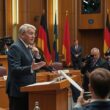The German Bundestag’s Committee on the Verification of Elections (Wahlprüfungsausschuss) is poised to issue a recommendation regarding a potential recount of the February federal election, a move fraught with potential political ramifications. According to reports from “Der Stern” magazine, based on confidential sources, a decisive committee meeting could occur as early as next week. While the office of committee chairman Macit Karaahmetoglu (SPD) has refrained from confirming this timeline, the prospect of a recount is generating considerable tension within the German political landscape.
The committee’s role is primarily advisory, with its recommendation subject to a parliamentary vote. Should the parliament reject a recount, the “Alliance Sahra Wagenknecht” (BSW), which narrowly missed the 5% threshold by approximately 9,500 votes, retains the option to appeal the decision to the Federal Constitutional Court.
The composition of the nine-member committee highlights the inherent political maneuvering at play. Comprising three representatives from the CDU/CSU, two from the SPD and one each from the AfD, the Greens and the Left, the ruling black-red coalition holds a significant advantage in shaping the committee’s outcome. This control allows the coalition to effectively manage the proceedings, suggesting a prevailing disinclination toward facilitating a recount.
The significance of a recount lies in the potential impact on the parliamentary balance. Should BSW successfully enter the Bundestag following a recount, it would destabilize the current coalition’s majority. Current projections suggest the most likely scenario in such a circumstance would be the incorporation of the Greens into the coalition, although a minority government or even fresh elections are also possibilities.
While the ruling coalition appears hesitant, the AfD has signaled support for a review, with parliamentary group manager Stephan Brandner stating his faction intends to vote in favor of a recount. He justified this stance, arguing that the slim margin and potential for significant impact necessitate absolute clarity.
BSW leader Sahra Wagenknecht has repeatedly urged a swift resolution, criticizing the committee’s perceived delays and accusing it of disrespecting the Federal Constitutional Court. She characterized the combined reluctance of both government and opposition as a “remarkable front” aimed against her party. This accusation underscores the deeply politicized nature of the process and the high stakes involved in the Committee’s impending decision. The case tests not only the integrity of the electoral process but also the stability of the German government.





